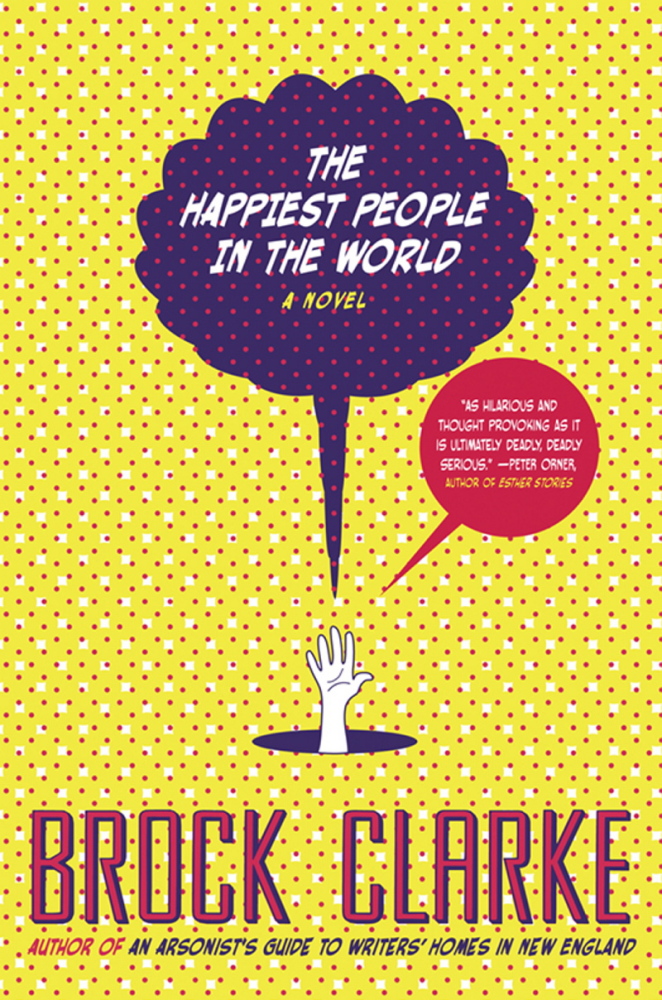A 2013 study found Denmark could boast the world’s happiest citizens, yet Brock Clarke’s new screwball novel, “The Happiest People in the World,” depicts happiness as a dangerous and annoying state of mind. Clarke, author of “An Arsonist’s Guide to Literary Homes in New England,” takes his protagonist out of Denmark and deposits him in upstate New York, where Jens Baedrup, our naive hero, pretends to be Swedish. Jens’ assumed identity, of a happy person in an unhappy circumstance, allows Clarke to explore the elastic and elusive nature of optimism while satirizing the spy novel and honing his skills as an absurdist. By taking the happiest person in the world out of his natural habitat, we see more clearly America’s futile preoccupation with trying to find happiness at any price.
The high-speed novel opens with a real event, in which a Danish cartoonist for a newspaper created a cartoon depicting Muhammed with a bomb in his turban. Jens tells his wife that he has accepted an assignment from his editor at the “Optimist” to draw a cartoon depicting how he views Muhammed despite the inherent controversy in the topic, because, as a member of the happiest country in the world, he had been “thinking everything was going to be just fine.”
When two Muslim teenagers burn down his house in the middle of the night, it becomes clear that in this novel optimism is reckless. Even they are falsely optimistic, setting fire to a house even though “they’d never meant to kill anyone.” The Muslim teenagers believe Jens is dead, when in fact an American CIA agent is taking him to a depressing town that is home to the agent’s former lover, who has agreed to give Jens a job as a high school guidance counselor.
Tolstoy famously said, “All great literature is one of two stories: a man goes on a journey or a stranger comes to town.” Brock Clarke, through the various points of view he uses in “The Happiest People in the World” (including, in the opening chapter, a narration by a moose head mounted on the wall), allows both of Tolstoy’s tropes to coexist.
Jens becomes Henry, on a journey to Broomeville, New York, and in the small town, no one knows what to make of this stranger who doesn’t know the difference between Stevie Ray Vaughan and Stevie Wonder. Strange indeed, they agree.
This screwball spy novel accelerates at breakneck speed. Without allowing each event time to breathe or providing the reflection one might wish for following shootouts and high-speed chases, “The Happiest People in the World” is more focused on plot and humor than characterization.
Clarke sets high stakes from the beginning: Death pursues Jens, or, at the very least, there is always the chance that someone will know he’s not really a Swedish high school guidance counselor.
Yet, rather than spending time exploring the foibles of this blindly optimistic man, Clarke rushes to his next punchline or cliffhanger, ending chapters with page turning phrases like, “and that ended up being the last thing that Søren ever saw.” This foreshadowing often falls short of its desired delivery.
The book succeeds in highlighting how the same misunderstandings and disastrous decisions that can cause great cultural tragedies, as in the case of the cartoon Muhammed, can crop up between the closest family members.
In small town New York, wives and husbands are estranged, as are fathers and sons, brothers and sisters. Unhappiness exists, Clarke seems to conclude, wherever there are people trying to avoid it, and it is the imperfect, pessimistic moments that make us whole and create meaning and mindfulness.
This novel has plenty to appreciate: the zany dialogue and narration, for one, and its refusal to be one kind of book. Perhaps most interesting is the outsider’s view, stripped of familiarity, it provides of what it is to be a modern American and what exactly we mean – what we are willing to give up – when we strive to be happy.
Ellen O’Connell is a freelance writer who lives in Portsmouth, New Hampshire. She can be contacted at:
ekoconnell@gmail.com
Send questions/comments to the editors.



Success. Please wait for the page to reload. If the page does not reload within 5 seconds, please refresh the page.
Enter your email and password to access comments.
Hi, to comment on stories you must . This profile is in addition to your subscription and website login.
Already have a commenting profile? .
Invalid username/password.
Please check your email to confirm and complete your registration.
Only subscribers are eligible to post comments. Please subscribe or login first for digital access. Here’s why.
Use the form below to reset your password. When you've submitted your account email, we will send an email with a reset code.